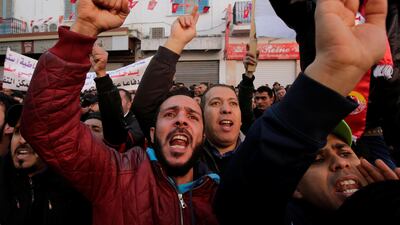The Tunisian government billed Sunday as a day to mark the anniversary of the Jasmine Revolution, a day when Tunisians would come together in song, dance and laughter to mark seven years since the ousting of former president Zine Abedine Ben Ali.
But as crowds began to gather in the capital’s Bourguiba Avenue on a chilly Sunday morning, it was not the demonstration of national unity for which the government might have hoped. There were the breakdancing teenagers, and recitals of the national anthem, but down the avenue, as the speaker reverb faded, the bellowed chants could be heard.
“The people want the fall off the budget!” — an echo of “The people want the fall of the regime!” call that came to define the Jasmine Revolution of 2011 and indeed much of the Arab uprising.
Several groups had announced plans to demonstrate at the festival, not only against the controversial budget, the initial cause of countrywide protests, but in rejection of a number of reforms announced by the government in an effort to appease the disgruntled masses.
In response to widespread protests and increasing pressure, president Beji Caid Essebsi dispatched himself to the impoverished Tunis district of Ettadhamen. He had never set foot in the place before.
On Saturday, the minister of social affairs, Mohamed Trablesi, announced an aid package of 170 million dinars (Dh250.47m) and a number of reforms. "This will reach about 250,000 families," he declared. "It will help the poor and the middle class."
The reforms, he said, included medical care for all Tunisians and social housing for the disadvantaged. Without giving further details, he said the reforms had already been planned "for months."
But in a country where many of the poorest are struggling even to put food on the table, the package, which averages out to around $27 (Dh99) per family was seen as little more than an empty gesture, and few were convinced. “They are trying to buy us off, and not even for a good price,” said Lina Al Soussi, 32, as she marched along Bourguiba Avenue.
______________
Read more:
Tunisians spill into the streets to demand better living conditions
Opinion: Austerity is not the right fix for Tunisia's circumstances
Nearly 800 arrested as protests continue in Tunisia
______________
Tareq Tookebry, 29, who runs a civil society organisation, took a similar view. “Why, only now, is the president pretending to be a saviour? We have turmoil, and suddenly he shows up to show people he is trying to fix everything. The president is no saviour; he is just thinking about the 2019 elections. They are saying nothing; it is not real reform.”
Amira Hamad, 25, an unemployed university graduate, was equally weary of the reforms. "They will do the minimum they can get away with, so now we will starve just four days a week, instead of five.” She added, "The change is about more than just a few dinars extra per week. The system is broken.”
The protests erupted last week in response to the introduction of a drastic new finance law, which saw subsidies cut for staple foods and taxes raised on other basics, such as mobile phone credit and petrol raised.
Small but vocal protests grew through Sunday afternoon, though rather than one unified call, they were a miscellany of different groups, all with differing demands. A group of young men stood on the steps outside the Théâtre Municipal de Tunis, chanting solidarity with Palestine. There was a procession by Manich m'samih, a group opposed to amnesty for former Ben Ali regime figures. They chanted, “Where, where, where is the list … we’ve been waiting seven years, we do not forgive” — referring to a list of businessmen and public officials known to have been involved in corruption which has never been published in full.
Mr Tookebry is suspicious of the country's current leadership. "The old regime is trying to re-establish itself in the new political climate. Many of the ministers are from Ben Ali’s regime. Too many symbols of the old regime are in government. The old regime has come back through the door as if nothing happened and now it is stronger.”
But it was not all anti-government chants, Ennahda supporters chuckled as a comedian took to the main stage and blasted those who claim to be broke, but had money to buy drugs and cake — a swipe at those involved in the past week’s riots and protests. Hundreds packed in front of the UGTT union headquarters for a speech in commemoration of 2011 by union head Nouredine Taboubi.
As the crowds thinned, a hard-core of young men remained, setting off flares, and banging drums. Clapping and screaming “Down with the budget!” at one point they charged towards riot police. But the police line stood strong. One man was dragged away, his face turning white, such is the fear of the police system here.
Sunday’s protests were far from the mass demonstrations many had hoped for, but the variety of grievances on show run deep, and even as the crowd disperses, those grievances remain. Sunday would not be the last day of protest in Tunisia, Ms Al Soussi promised.
"We don’t have to win today. Every day we have a new opportunity to win, we will keep coming back until we get what we deserve”.
Reflecting on the situation, Mr Tookebery said, “We, as Tunisian youth, are not responsible enough. It’s time to start relying on ourselves. Many of us are waiting for a saviour, but the government gives us nothing. We have to save ourselves.”


